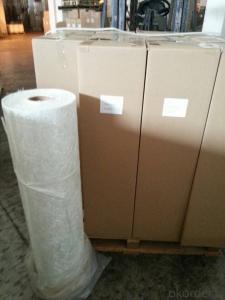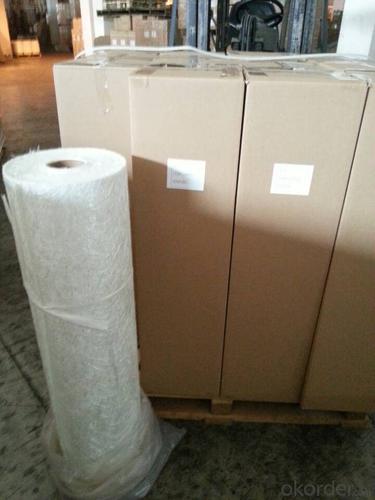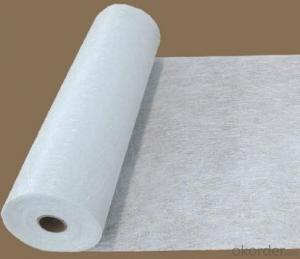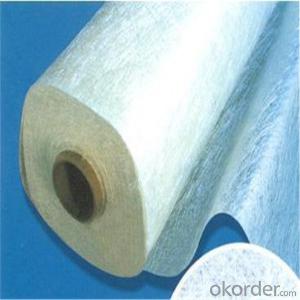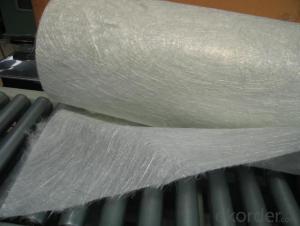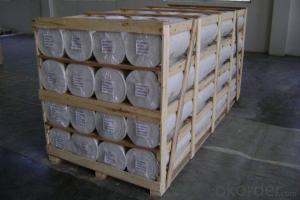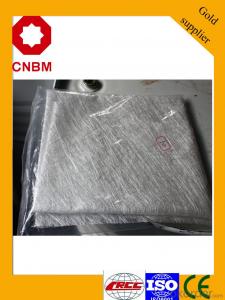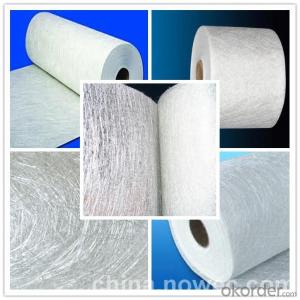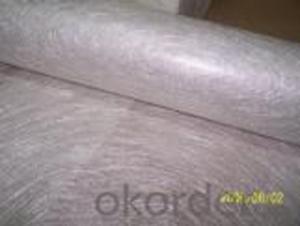C glass Chopped Strand Mat- High Quality CCSM
- Loading Port:
- Shanghai
- Payment Terms:
- TT OR LC
- Min Order Qty:
- 1000 kg
- Supply Capability:
- 100000 kg/month
OKorder Service Pledge
OKorder Financial Service
You Might Also Like
Product description of Fiber Glass Powder Emulsion Chopped Strand Mat
Glass Fiber Emulsion Binder Chopped Strand Mat is an unwoven fabrics consisting of randomly distributed chopped strands held together with Emulsion Binder.
Emulsion Binder Chopped Strand Mats are compatible with unsaturated polyester, vinyl ester, phenol and epoxy resins.
The products are widely used in hand lay-up process and can also be used in compression molding and continuous laminating process and hand layup process. The typical end-use applications include various panels, boats, bathroom accessories, automotive parts and cooling towers.
Specification of Emulsion Binder E-Glass Chopped Strand Mat
Property | Glass type | Weight(g/m2) | Width 200~3300 | Roll Weight | Moisture Content /% | Combustible Content /% | Breakage Strength /N |
Test Method | GB/T 1549 | ISO3374:2000 | ISO3374 | GB/T17470-1998 | ISO3344:1997 | ISO1887:1995 | ISO3342 |
CMC 80 | C-GLASS | 80±16 | ±5 | 6~50 | <0.2< span=""> | 13.6±0.35 | ≥200 |
CMC 100 | C-GLASS | 100±10 | ±5 | 6~65 | <0.2< span=""> | 9.5±0.35 | ≥170 |
CMC 150 | C-GLASS | 150±15 | ±5 | 6~97 | <0.2< span=""> | 8.0±0.35 | ≥40 |
CMC 225 | C-GLASS | 225±22 | ±5 | 6~150 | <0.2< span=""> | 5.0±0.6 | ≥60 |
CMC 300 | C-GLASS | 300±30 | ±5 | 6~180 | <0.2< span=""> | 4.0±0.6 | ≥90 |
CMC 450 | C-GLASS | 450±45 | ±5 | 6~180 | <0.2< span=""> | 3.8±0.6 | ≥120 |
CMC 600 | C-GLASS | 600±60 | ±5 | 6~240 | <0.2< span=""> | 3.6±0.6 | ≥150 |
CMC 900 | C-GLASS | 900±90 | ±5 | 6~190 | <0.2< span=""> | 3.4±0.6 | ≥180 |
Characteristics of Emulsion Binder C Glass Chopped Strand Mat
1.Uniform density ensures consistent fiberglass content and mechanical properties of the composites products;
2.Uniform powder distribution ensures good mat integrity, little loose fibers and small roll diameter;
3.Excellent flexibility ensures good mold ability with no spring back at sharp angles;
4.Fast and consistent wet-out speed in resins and rapid air lease reduce resin consumption and production cost, and enhances productivity and mechanical properties of the end products.
FAQ:
Why Choose us?
CNBM is a stated own company, provide the guarantee for the best quality, best service and safety business.
- Q: Can fiberglass mat tissue be used for creating molds?
- Using fiberglass mat tissue for creating molds is not possible. Fiberglass mat tissue is primarily utilized as a reinforcement layer in fiberglass composite applications due to its thin and lightweight nature. It is not intended to be used as a material for making molds. Instead, molds are commonly made using silicone, resin, or plaster, as these materials have the capacity to capture intricate details and offer a polished surface finish.
- Q: Does fiberglass mat tissue provide good acoustical performance?
- Yes, fiberglass mat tissue does provide good acoustical performance. It has excellent sound absorption properties due to its fibrous composition, which helps reduce echo and improve overall sound quality in a given space.
- Q: Can fiberglass mat tissue be used for boat building?
- Certainly, fiberglass mat tissue is a viable option for boat construction. It is a versatile and lightweight material that is frequently utilized in the building of boats. Its composition consists of thin fiberglass strands woven together to form a mat-like structure. This material is renowned for its exceptional strength-to-weight ratio, making it an optimal selection for boat builders. The utilization of fiberglass mat tissue in boat construction primarily serves to fortify the structure and provide added durability. It can be applied to various parts of the boat, including the hull and deck, to enhance its resilience and safeguard it against impacts. Moreover, it can be employed to create a smooth and uniform surface, which is crucial for achieving a professional-grade finish. One of the notable advantages of employing fiberglass mat tissue in boat construction lies in its ease of application. It can be effortlessly tailored to the desired size and molded to fit the desired shape, allowing for flexibility and customization. Additionally, it can be easily layered with other materials, such as epoxy resin, to create a robust and dependable composite. Furthermore, fiberglass mat tissue exhibits exceptional resistance to water and corrosion, rendering it suitable for marine environments. It is also recognized for its superb thermal and electrical insulation properties, both of which are highly advantageous for boat builders. In summary, fiberglass mat tissue is indeed a suitable choice for boat construction. Its lightweight nature, impressive strength, and resistance to water and corrosion establish it as a dependable and popular option among boat builders.
- Q: Can fiberglass mat tissue be used for insulation in shopping malls?
- Yes, fiberglass mat tissue can be used for insulation in shopping malls. It is a common and effective material for thermal insulation due to its low thermal conductivity and high resistance to heat transfer. Fiberglass mat tissue is also non-combustible, making it a safe option for commercial buildings like shopping malls. Additionally, it is lightweight, easy to install, and has excellent sound absorption properties, which can help in creating a comfortable and quiet environment within the mall. Overall, fiberglass mat tissue is a suitable choice for insulation in shopping malls, providing energy efficiency and improved indoor comfort.
- Q: Can fiberglass mat tissue be used for insulation in cold climates?
- Yes, fiberglass mat tissue can be used for insulation in cold climates. It is a commonly used material for insulation due to its low thermal conductivity and ability to trap air, providing effective insulation against cold temperatures.
- Q: Can fiberglass mat tissue be used for repairing fiberglass fenders?
- Yes, fiberglass mat tissue can be used for repairing fiberglass fenders. Fiberglass mat tissue is a versatile material that is commonly used in fiberglass repair work. It is often used as a reinforcement layer to add strength and durability to the repaired area. When repairing fiberglass fenders, the damaged or cracked area can be repaired by applying a layer of resin and then laying the fiberglass mat tissue over it. The mat tissue is then saturated with additional resin to create a strong bond and ensure a smooth finish. This process helps to restore the structural integrity of the fender and provide a seamless repair. However, it is important to note that the success of the repair depends on the extent of the damage and the skill of the person performing the repair.
- Q: What is the chemical resistance of fiberglass mat tissue?
- Fiberglass mat tissue has excellent chemical resistance due to its composition, which includes a high percentage of glass fibers. These fibers provide a barrier against various chemicals, making the fiberglass mat tissue highly resistant to corrosion and degradation when exposed to acids, alkalis, solvents, and other harsh chemicals.
- Q: What are the potential health hazards associated with working with fiberglass mat tissue?
- Potential health hazards associated with working with fiberglass mat tissue include skin irritation, respiratory issues such as coughing and wheezing, eye irritation, and allergic reactions. Long-term exposure to fiberglass fibers can also lead to a condition called fiberglass lung, which is characterized by chronic coughing, chest tightness, and difficulty breathing. It is important to use proper protective equipment, such as gloves, goggles, and a respirator, when working with fiberglass mat tissue to minimize these risks.
- Q: Is fiberglass mat tissue water-resistant?
- Yes, fiberglass mat tissue is water-resistant.
- Q: How does fiberglass mat tissue contribute to the strength and durability of composite materials?
- Fiberglass mat tissue enhances the strength and durability of composite materials by providing reinforcement and structural integrity. The mat tissue consists of randomly arranged fibers that are bonded together, creating a strong and flexible matrix. This matrix acts as a support system, distributing stress and load across the material, thereby preventing cracks and fractures. Additionally, the fiberglass mat tissue acts as a barrier against moisture and other environmental factors, protecting the composite material from degradation and ensuring long-lasting performance.
Send your message to us
C glass Chopped Strand Mat- High Quality CCSM
- Loading Port:
- Shanghai
- Payment Terms:
- TT OR LC
- Min Order Qty:
- 1000 kg
- Supply Capability:
- 100000 kg/month
OKorder Service Pledge
OKorder Financial Service
Similar products
Hot products
Hot Searches
Related keywords
